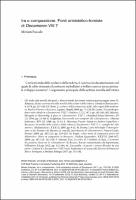Chapter Ira e compassione. Fonti aristotelico-tomiste di Decameron VIII 7
| dc.contributor.author | Pascale, Miriam | |
| dc.date.accessioned | 2022-06-01T12:15:48Z | |
| dc.date.available | 2022-06-01T12:15:48Z | |
| dc.date.issued | 2020 | |
| dc.identifier | ONIX_20220601_9788855182362_368 | |
| dc.identifier.issn | 2704-5919 | |
| dc.identifier.uri | https://library.oapen.org/handle/20.500.12657/56185 | |
| dc.description.abstract | This essay aims to examine the philosophic sources behind the representation of passions in Boccaccio’s tale of the scholar and the widow (Decameron VIII 7). If the definition of anger is attributable to Aristotle’s Nicomachean Ethics, I believe that it is possible to assume that the description of compassion, only mentioned in the moral treatise, derives instead from the Aristotle’s Rhetoric, where compassion is seen as a passion opposed to a kind of wrath, that is, indignation. The paper also investigates Boccaccio’s reception of the Latin translation of Aristotle’ Rhetoric. Did Boccaccio have direct knowledge of the Aristotelian text? Or had it been mediated to him by Thomas Aquinas’ Summa Theologiae? | |
| dc.language | Italian | |
| dc.relation.ispartofseries | Studi e saggi | |
| dc.subject.other | Decameron | |
| dc.subject.other | intertextuality | |
| dc.subject.other | passions | |
| dc.subject.other | compassion | |
| dc.subject.other | wrath. | |
| dc.title | Chapter Ira e compassione. Fonti aristotelico-tomiste di Decameron VIII 7 | |
| dc.type | chapter | |
| oapen.identifier.doi | 10.36253/978-88-5518-236-2.07 | |
| oapen.relation.isPublishedBy | bf65d21a-78e5-4ba2-983a-dbfa90962870 | |
| oapen.relation.isbn | 9788855182362 | |
| oapen.series.number | 219 | |
| oapen.pages | 14 | |
| oapen.place.publication | Florence |

